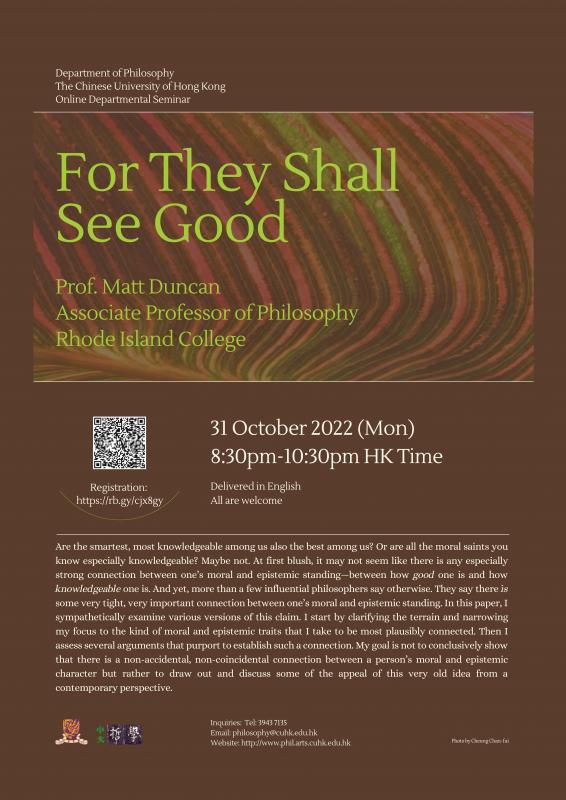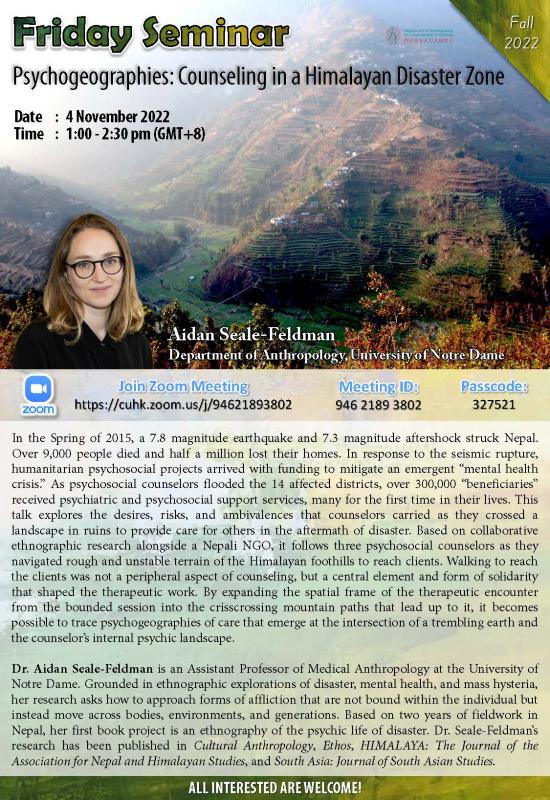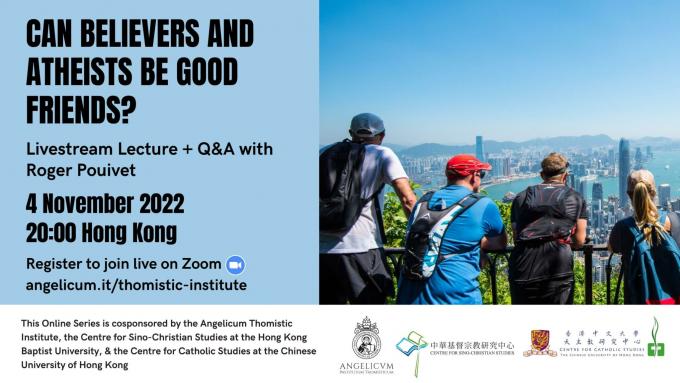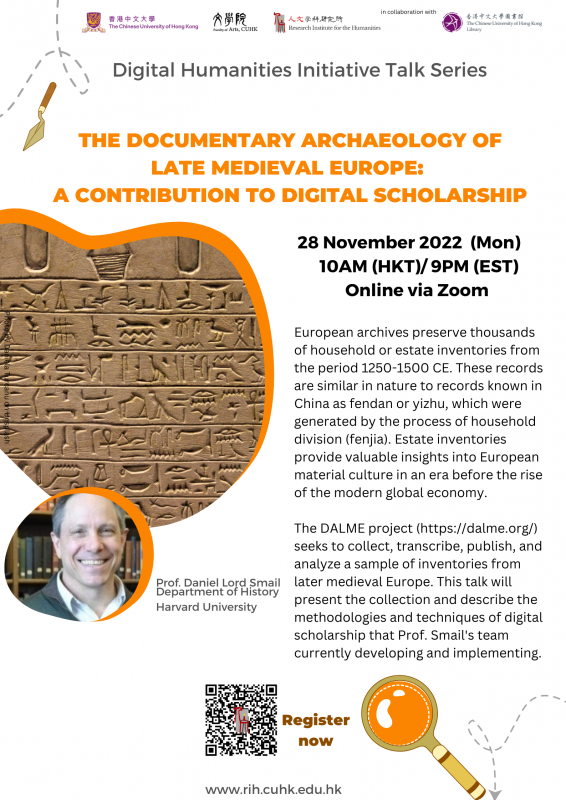Philosophy - Departmental Seminar: For They Shall See Good

Are the smartest, most knowledgeable among us also the best among us? Or are all the moral saints you know especially knowledgeable? Maybe not. At first blush, it may not seem like there is any especially strong connection between one’s moral and epistemic standing—between how good one is and how knowledgeable one is. And yet, more than a few influential philosophers say otherwise. They say there is some very tight, very important connection between one’s moral and epistemic standing. In this paper, I sympathetically examine various versions of this claim. I start by clarifying the terrain and narrowing my focus to the kind of moral and epistemic traits that I take to be most plausibly connected. Then I assess several arguments that purport to establish such a connection. My goal is not to conclusively show that there is a non-accidental, non-coincidental connection between a person’s moral and epistemic character but rather to draw out and discuss some of the appeal of this very old idea from a contemporary perspective.
Speaker
Prof. Matt Duncan
Associate Professor of Philosophy, Rhode Island College
Psychogeographies: Counseling in a Himalayan Disaster Zone

In the Spring of 2015, a 7.8 magnitude earthquake and 7.3 magnitude aftershock struck Nepal. Over 9,000 people died and half a million lost their homes. In response to the seismic rupture, humanitarian psychosocial projects arrived with funding to mitigate an emergent "mental health crisis." As psychosocial counselors flooded the 14 affected districts, over 300,000 "beneficiaries" received psychiatric and psychosocial support services, many for the first time in their lives. This talk explores the desires, risks, and ambivalences that counselors carried as they crossed a landscape in ruins to provide care for others in the aftermath of disaster. Based on collaborative ethnographic research alongside a Nepali NGO, it follows three psychosocial counselors as they navigated rough and unstable terrain of the Himalayan foothills to reach clients. Walking to reach the clients was not a peripheral aspect of counseling, but a central element and form of solidarity that shaped the therapeutic work. By expanding the spatial frame of the therapeutic encounter from the bounded session into the crisscrossing mountain paths that lead up to it, it becomes possible to trace psychogeographies of care that emerge at the intersection of a trembling earth and the counselor's internal psychic landscape.
Speaker
Dr. Aidan Seale-Feldman (Department of Anthropology, University of Notre Dame)
Dr. Aidan Seale-Feldman is an Assistant Professor of Medical Anthropology at the University of Notre Dame. Grounded in ethnographic explorations of disaster, mental health, and mass hysteria, her research asks how to approach forms of affliction that are not bound within the individual but instead move across bodies, environments, and generations. Based on two years of fieldwork in Nepal, her first book project is an ethnography of the psychic life of disaster. Dr. Seale-Feldman’s research has been published in Cultural Anthropology, Ethos, HIMALAYA: The Journal of the Association for Nepal and Himalayan Studies, and South Asia: Journal of South Asian Studies.
Join Zoom Meeting: https://cuhk.zoom.us/j/94621893802
Meeting ID: 946 2189 3802
Passcode: 327521
All interested are welcome
M.A. Programme in Comparative and Public History Information Seminar cum Public Lecture

2:30pm-3:00pm - Information Seminar
3:00pm-4:00pm – Public Lecture: 古代的國、家、人:馬丁蓋爾回歸與婦人黃氏回歸
Speaker:
Professor PUK Wing Kin, Department of History
World History Seminar (2022-23) - Medical Lives in the Age of Surgical Revolution: An Example of Medical History and World History

This talk introduces medical history as an area of historical research and presents, as an example, my research into the history of a generation of doctors, including the first women, trained in Britain in the last quarter of the nineteenth century - a period of rapid changes in western medical knowledge. Many in the group were students of Joseph Lister as he developed his new ideas and methods of antiseptic surgery; they adapted and put his ideas into practice in hospitals, households, war and peace, as they pursued their careers in Britain and around the world. The research offers a new view of when, how and where his revolutionary surgical ideas spread into practice, and highlights the importance of medical networks – both male and female.
Speaker
Prof. Marguerite DUPREE
School of Social and Political Sciences, University of Glasgow
Marguerite Dupree is Professor of Social and Medical History (emerita) at the University of Glasgow. She is co-author with Anne Crowther of Medical Lives in the Age of Surgical Revolution (2010). Most recently, she has been co-holder, with Anne-Marie Rafferty of a Leverhulme Trust project grant for research into the history of infection control in British hospitals c1870-1970. Their co-edited volume, Germs and Governance: the past, present and future of hospital infection, prevention and control was published in 2021. Among her other books and articles are publications on the history of hydropathic establishments, on medical practitioners and the business of life assurance, and on issues of service integration in the National Health Service 1948-74. She is also the author of books and articles on family history during industrialisation (Family Structure in the Staffordshire Potteries 1840-1880 (1995) and on the history of government-industry relations in Britain in the nineteenth and twentieth-centuries (editor, Lancashire and Whitehall: the Diary of Sir Raymond Streat, 1931-1957, 2 vols. (1987).
ZOOM Meeting ID: 990 8868 4183
Meeting link: https://cuhk.zoom.us/j/99088684183
World History Seminar (2022-23) - Seeing the Forest but not the Trees? A Deep Time History of the Upper Amazon

The upper Amazon represents the forested upland between the Andean highland valleys and the canopied Amazonian lowlands in western South America. Traditionally, the region is thought to have been a marginal environment of dense vegetation, steep slopes and white-water rivers that limited human population growth and social complexity beyond simple horticultural villages, in essence, an area lacking true history prior to the arrival of Europeans on the 16th century. However, new scientific techniques and methodologies combined with renewed archaeological focus in the Upper Amazon have shown that the parts of the region were home to dense settlements and complex cultural developments, and that these societies interacted with cultures from the Pacific coast, Andean highlands, and Amazonian lowlands via mechanism such as trade, exchange, migration, and conflict. Though a diachronic analysis of the cultural developments in the Jaén region of northern Peru, this presentation aims to elucidate the Upper Amazon’s rich history while also creating a framework for future investigations.
Speaker
Dr. Ryan CLASBY
ACLS Fellow, American Council of Learned Societies
ZOOM Meeting ID: 990 8868 4183
Meeting link: https://cuhk.zoom.us/j/99088684183
Can Believers and Atheists be Good Friends?
How to Win Friends and Influence Others: Living Meaningfully Today

Many contemporary young people report feeling more distant than ever from each other and real life. Is there a way to overcome that ‘distance’ between each other and find real community? Even more so, for people of faith, the modern world poses unique challenges to living a meaningful life alongside friends or family who do not believe as we do, or whose views of moral or religious issues might even be starkly opposed. Can we find a way to live fulfilling relationships with others, despite not sharing the same worldview? In all of these areas, meaning in life, love, and relationships are perennial problems for human beings. This series brings together top scholars who propose that classical philosophical or theological insights on these topics can help us understand ourselves, our friends, or the world better; help us form meaningful, deep friendships with those around us; and, overall, help us live better lives.
The talk series is open to the general public, but undergraduate and graduate students are particularly welcome to attend.
Speaker
Roger Pouivet ( University of Lorraine and Archives Poincaré )
This Online Series is co-sponsored with the Centre for Sino-Christian Studies at the Hong Kong Baptist University and the Centre for Catholic Studies at the Chinese University of Hong Kong.
The Documentary Archaeology of Late Medieval Europe: A Contribution to Digital Scholarship

European archives preserve thousands of household or estate inventories from the period 1250-1500 CE. These records are similar in nature to records known in China as fendan or yizhu, which were generated by the process of household division (fenjia). Estate inventories provide valuable insights into European material culture in an era before the rise of the modern global economy.
The DALME project (https://dalme.org/) seeks to collect, transcribe, publish, and analyze a sample of inventories from later medieval Europe. This talk will present the collection and describe the methodologies and techniques of digital scholarship that Prof. Smail’s team currently developing and implementing.
Speaker
Professor Daniel Lord Smail , Department of History, Harvard University
Professor Daniel Lord Smail is Frank B. Baird, Jr. Professor of History at Harvard University, where he works on the history and anthropology of Mediterranean societies between 1100 and 1600 and on deep human history. In medieval European history, his work has explored the legal, social, and cultural history of the cities of Mediterranean Europe, with a focus on Marseille in the later Middle Ages. He has covered subjects ranging from women and Jews to legal history and spatial imagination, which was the subject of his first book, Imaginary Cartographies: Possession and Identity in Late Medieval Marseille (1999). His most recent book, Legal Plunder: Households and Debt Collection in Late Medieval Europe (Harvard University Press, 2016), approaches transformations in the material culture of the later Middle Ages using household inventories and inventories of debt collection from Lucca and Marseille. With Gabriel Pizzorno and Laura Morreale and contributors, he recently published the online collection “The Documentary Archaeology of Late Medieval Europe.” He is currently working on a book featuring an enslaved Berber woman in early fifteenth-century Marseille who engineered her own self-manumission.
Enquiry
Enquiry: rihs@cuhk.edu.hk
Website: www.rih.cuhk.edu.hk
Early Modern Letters Online: (Re)Collecting Correspondence and (Re)Connecting Correspondence Networks

Based on the work of the Oxford digital humanities research project Cultures of Knowledge, this paper will discuss the evolution of an international union catalogue of early modern letters. Citing examples from a wide range of correspondences, it will discuss how best to recombine the written exchanges recorded in manuscript letters that are preserved today in numerous archives around the world, whilst also enabling scholars to interrogate the accumulated metadata in revealing ways.
Speaker
Ms. Miranda Lewis, Faculty of History, University of Oxford
Ms. Miranda Lewis is the editor of the union catalogue of correspondence Early Modern Letters Online. Miranda is an Associate Member of the Faculty of History at the University of Oxford, where she works and publishes on a range of early modern correspondence-related topics.
Enquiry
Enquiry: rihs@cuhk.edu.hk
Website: www.rih.cuhk.edu.hk



